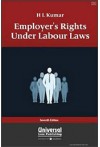- Author(s): H.L. Kumar
- Publisher: Universal LexisNexis
- Edition: 7 Ed 2018
- ISBN 13 9789386515223
- Approx. Pages 340 + contents
- Format Paperback
- Approx. Product Size 24 x 16 cms
- Delivery Time 3-5 working days (within Kerala & South India) (Others 7-9 days)
- Shipping Charge Extra (see Shopping Cart)
.............................................................................................................................
Description
Needless to reiterate that the labour laws in India were enacted just and immediately after its independence i.e. 1947. At that point of time, there were
neither many industries nor disputes between employer and employees. However, the exploitation of labour i.e., working class, was very common since the avenues for jobs were not available and the employers would dictate their terms while providing employment. There were no fixed hours of working or even safety measures for workers. Under these circumstances, the labour laws were enacted which protected the working class. The industries have grown, the avenues for jobs have widened but the laws could not keep the pace with the developments since the amendments to the labour laws became difficult due to opposition of the political parties who have their vote bank amongst working class and exercise control over the trade unions. Hence, the laws have tilted in favour of the working class and the employers' rights remained restricted. Accordingly, it has necessitated to highlight and combine the employer's rights under labour laws. The main object of this revised edition is to broaden the clarifications, ratio of decided cases and to retain, to the fullest extent, the direct and simple approach of the authors. They have emphasised on short words and brief sentences for better understanding of the readers. Emphasis has been laid on case studies of the important judgments by giving the brief facts so that the readers could apply the ratios for clarity in understanding the principles as laid down. The book, we pictured, is concise and practical, but very much enough to provide every information about rights of the employers over their employees.
.............................................................................................................................
Contents
Part 1 - Genesis of Employment
1. Employment Related Laws an Introduction
Part 2 - Employer’s Rights and Worker’s Obligations
2. A Worker is Bound to Comply with the Terms of Service
3. A Worker has to Work at any Place as Directed by the Employer
4. A Worker Should not Show Indifference to Work
5. An Employee Cannot Work in More than One Establishment
6. A Worker Must be Honest Observe Honesty and Commit no Fraud
7. A Worker Must be Regular
8. An Employee Must Observe Punctuality in Attendance
9. A Worker Should not Absent when his Leave is not Sanctioned
10. An Employee Must Send Medical Certificate for Availing of Sick Leave
11. A Worker Cannot Over-Stay Leave
12. An Employee Cannot Claim Leave as and when He Desires
13. A Worker can be Removed on Ground of Continued Ill-Health
14. A Worker Ought not Neglect His Duties
15. An Employee Cannot Carry on Union Activities During Working Hours and on
the Premises of the Establishment
16. A Worker Cannot Drink While on Duty
17. An Employee Cannot Breach the Bond When Undertakes to Work for a
Specified Period
18. A Worker is Liable to be Punished for Abusive Language
19. An Employee Cannot Loiter During Duty Hours
20. An Employee Cannot Sleep During Duty Hours
21. A Worker Cannot Stay Inside the Premises During Strike
22. An Employee Must not Commit any Offence
23. No Money-Lending Business at the Establishment
24. A Worker Derelict in His Duties
25. An Employee Must not Gamble During Duty Hours
26. A Worker Cannot Adopt ‘Go-Slow’ Tactics
27. Assault on the Managerial Personnel Entails Dismissal From Service
28. A Male Worker Cannot Misbehave with Female Co-Worker
29. An Employee Must not Indulge in Sexual Harassment
30. Inefficiency Can be the Cause of Dismissal
31. Instigating Illegal Strike is Punishable with Imprisonment
32. A Worker Will not be Entitled to Wages for the Strike Period
33. A Worker Through His own Default Cannot Reap the Benefit Through Labour
Laws from His Employer
34. A Worker Cannot Stage Demonstration or Dharna on the Premises of the
Establishment
35. A Worker Should not Cause Damage to Property and Employer’s Reputation
36. A Worker Must Vacate the House Allotted to Him by the Employer
37. An Employee Will Lose His Job When Confidence of the Employer is Lost
38. An Employer Can Forfeit Gratuity of an Employee
40. An Employer Cannot Always be Held Liable to Pay Compensation for Every Accident in the Factory/Establishment
.............................................................................................................................
Author Details
H. L. Kumar, Advocate Supreme Court of India, Editor, Labour Law Reporter
.............................................................................................................................

